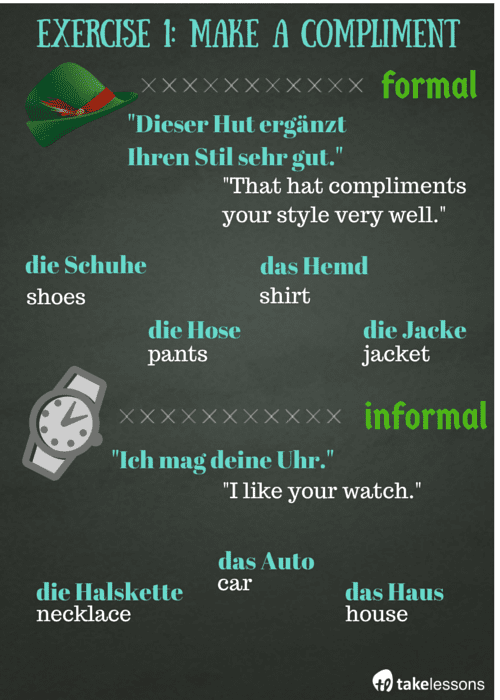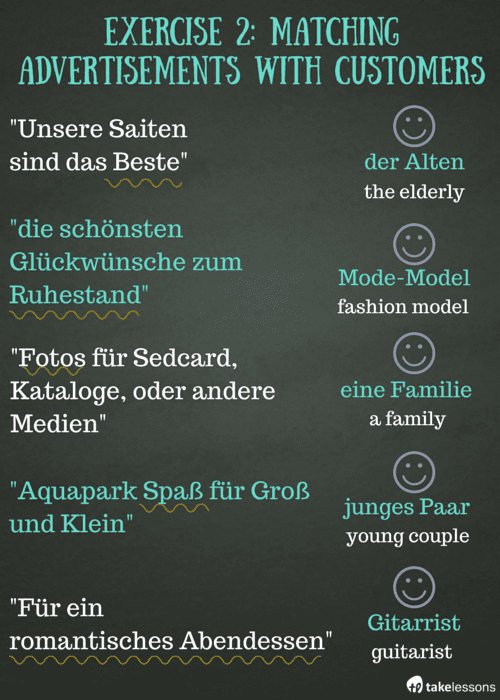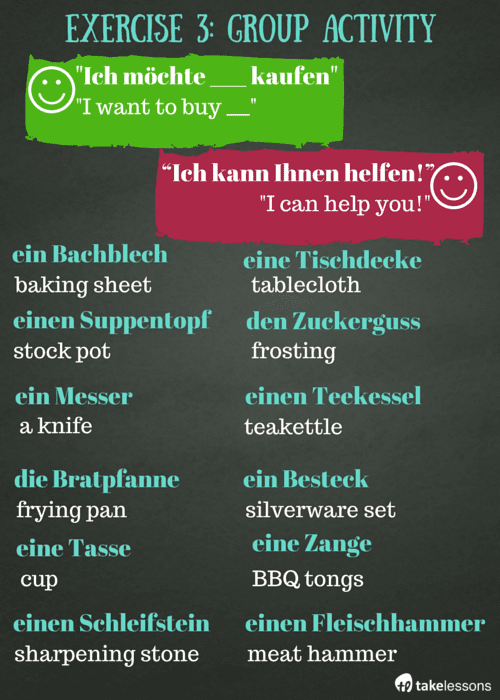Establishing a solid German vocabulary foundation is key. Memorizing a long list of words, however, can be difficult–not to mention frustrating at times. Below, German teacher Noel S. shares three easy exercise to help students improve their German vocabulary…
The sensation of accelerated learning that students experience when they begin to successfully use new concepts or skills generates confidence, so much that we know our opportunities for achievement are limitless. Using newly learned vocabulary words will definitely provide that same effect!
The question is, how can we make sure to get the most benefit from our learning efforts? We want to add German vocabulary words that will actually be useful and the best way to do that is to practice. Below are three easy exercises to help you improve your German vocabulary.
Exercise 1: Make a Compliment
Everyone loves a compliment, so let’s learn vocabulary words related to delivering a nice comment to another person; then practice using them with other people. Start with a sample sentence like the one below:
Example:
- English: That hat complements your (formal) style very well.
- German: Dieser Hut ergänzt Ihren Stil sehr gut.
Next, learn German vocabulary words for various articles of clothing you could mention besides a hat. Then practice using these words in the sentence above, which contains the formal use of the possessive adjective “your.” Make sure to adjust the nominative demonstrative article to match each new vocabulary word’s gender. Remember, masculine is dieser, neuter is dieses, feminine is diese, plural is diese.
Alternative German Vocabulary Words:
- die Schuhe (shoes)
- die Hose (pants)
- das Hemd (shirt)
- die Jacke (jacket)
You can add more variety to the conversation by using the informal compliment structure as seen in the example below. Make sure to change the possessive adjective to the accusative case (masculine = deinen, neuter = dein, feminine = deine, plural = deine.
Example:
- English: I like your watch.
- German: Ich mag deine Uhr.
Alternative German Vocabulary Words:
- die Halskette (necklace)
- das Auto (car)
- das Haus (house)

Exercise 2: Matching Advertisements with Customers
Advertisers spend most of their resources trying to connect their products with buyers. Read each German advertisement’s tagline below, translate the underlined keyword, then match it with the appropriate target customer.
Advertisement Taglines
- “Unsere Saiten sind das Beste”
- “die schönsten Glückwünsche zum Ruhestand“
- “Fotos für Sedcard, Kataloge, oder andere Medien”
- “Aquapark Spaß für Groß und Klein“
- “Für ein romantisches Abendessen“
Target Customer
- Der Alten
- Mode-Model
- eine Familie
- unges Paar
- Gitarrist

Exercise 3: Group Activity
Pretend your group is tasked with managing a retail cookware store. First, delegate one position to each person; for example, a salesperson for bakeware, knives, coffeemakers, pots and pans, barbecue, and formal dining ware.
Then, take turns assuming the role of a customer asking for help to purchase a certain item. The salesperson responsible for that section will have to recognize the German vocabulary word, and respond by saying, “Ich kann Ihnen helfen!” (I can help you!”).
The standard customer statement is, “Ich möchte ___ kaufen.” Review the vocabulary words, then put them out of sight. Split into teams if you’d like, and award points for correct answers. Here’s the German vocabulary word bank:
- ein Messer (a knife)
- eine Tasse (cup)
- ein Bachblech (baking sheet)
- die Bratpfanne (frying pan)
- ein Besteck (silverware set)
- einen Fleischhammer (meat hammer)
- einen Schleifstein (sharpening stone)
- eine Tischdecke (tablecloth)
- einen Teekessel (teakettle)
- den Zuckerguss (icing, frosting)
- einen Suppentopf (stockpot)
- eine Zange (barbecue tongs)

Learning German vocabulary doesn’t have to be painstakingly boring. Work with your German tutor to come up with different exercises in addition to the ones mentioned above. Remember, you won’t be able to hold a conversation very well if you don’t have a solid foundation of words.
 Noel S. teaches German and music lessons in Beachwood, OH. He minored in German during his undergraduate studies and holds a Masters degree in music from Dusquesne University. Noel has been teaching since 2001. Learn more about Noel here!
Noel S. teaches German and music lessons in Beachwood, OH. He minored in German during his undergraduate studies and holds a Masters degree in music from Dusquesne University. Noel has been teaching since 2001. Learn more about Noel here!
Brooke Neuman

